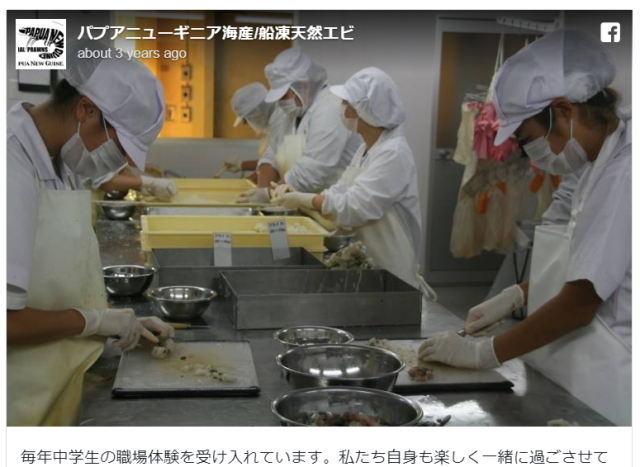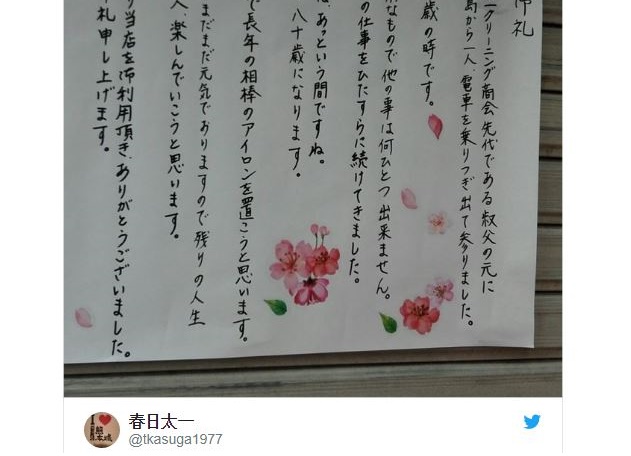employment (Page 2)
Working hours at this shrimp processing and packaging plant are outlined as: “Whenever the heck you feel like it.”
If you’re a fan of McDonald’s Japan, you might be sad to learn that your favorite item may be the staff’s worst nightmare.
Work part time for McDonald’s Japan and join the ranks of housewives, students, and Y-san: the saddest person you’ll ever meet.
Read More
Miyuki Muto, the president of a fish wholesaler, received a five-year suspended sentence for killing an employee after physically assaulting him.
After a man turned himself into police for refusing to pay for his meal, some wondered if he might be mentally ill. On the other hand, some suspect he might be saner than many in Japan.
A new survey conducted by the Japanese government found that nearly half of female temp workers faced discrimination as a result of being or becoming pregnant while in employment.
It’s been about two weeks since Curry Shop Shimizu opened for business in the Chitose-Funabashi area of Tokyo. Considering the only dish they sell is a curry which mimics the taste of human feces, you might expect sales to have been slow.
However, not only is business booming, the demand has become too much for owner and adult film star Shimiken to keep up. As a result he put out an ad for interns to help take his poopy curry to the next level. On top of that, if you thought Curry Shop Shimizu’s fortunes couldn’t get any better, they are attracting top-tier applicants on par with the nation’s leading corporations.
For many young people in Japan, August means summer vacation, festivals and free time. For fourth-year university students however, it means time to start interviewing for jobs. The job-hunting process in Japan is long, grueling and very systematic, culminating in interview after interview for the jobless, soon-to-graduate, young adults.
Interviews can be nerve-wracking for even the most experienced candidates, but Japanese companies don’t always ask the most predictable questions. In fact, some of their questions can be downright weird. Many of these oddball interview questions, however, may not actually be legal.
The world economy has taken a pretty big hit since 2007, and every country is doing what it can to recover. Some have been able to do better than others, but for most people, they haven’t gotten back to pre-crash numbers, whatever that may be.
While unemployment numbers have steadily decreased in the US, Japan has its own unique set of economic problems to deal with. With an unemployment rate sitting at 3.6 percent as of September 2014, an entirely different sort of problem is rearing its ugly head here. How can a low unemployment rate cause problems? For that answer, we have to turn to the parents.
As far as things not to say in an interview go, you’d think it’d be pretty high up on the list. But the young Japanese university student, rejected by all the other companies he’d applied to, was prepared to take the risk. “This company is the only option I have left,” he pleaded with the interviewer. “I’ll do anything!” An unusual strategy, certainly. But he got the job.
Japanese site Niconico News reports that the man is now entering his ninth year of employment with the company, so it seems the gamble paid off. But is the company’s positive reaction so unusual? Some Japanese employability experts are arguing that, for many companies, the ideal graduate recruit is a “hakushi” – a blank page that the company can do what they want with. When companies train new recruits extensively, an across-the-board willingness to learn is valued more than previous experience.
When people visit Japan, they often marvel at how great the service everywhere is. Trains run on time; a guy pops out of a little hatch like a station ninja when you’re struggling with a ticket vending machine; packages come precisely when they’re supposed to, and even if you miss them you can just call the driver on their mobile phone to arrange a new delivery time.
Day in, day out, stuff just works. And yet, unlike the many foreigners who live here, native Japanese take this all completely in their stride. Take this video, for example, which was taken by a foreigner living and uploaded to YouTube a couple of weeks ago…




















 Tokyo Skytree turns pink for the cherry blossom season
Tokyo Skytree turns pink for the cherry blossom season Adorable Totoro acorn key holders come with a special guest hidden inside[Photos]
Adorable Totoro acorn key holders come with a special guest hidden inside[Photos] Highest Starbucks in Japan set to open this spring in the Tokyo sky
Highest Starbucks in Japan set to open this spring in the Tokyo sky The 10 most annoying things foreign tourists do on Japanese trains, according to locals
The 10 most annoying things foreign tourists do on Japanese trains, according to locals Yakuzen ramen restaurant in Tokyo is very different to a yakuza ramen restaurant
Yakuzen ramen restaurant in Tokyo is very different to a yakuza ramen restaurant Osaka establishes first designated smoking area in Dotonbori canal district to fight “overtourism”
Osaka establishes first designated smoking area in Dotonbori canal district to fight “overtourism” Japan just had its first same-month foreign tourist decrease in four years
Japan just had its first same-month foreign tourist decrease in four years Starbucks Japan adds a Shine Muscat Grape Frappuccino to the menu for a limited time
Starbucks Japan adds a Shine Muscat Grape Frappuccino to the menu for a limited time Is Sapporio’s Snow Festival awesome enough to be worth visiting even if you hate the snow? [Pics]
Is Sapporio’s Snow Festival awesome enough to be worth visiting even if you hate the snow? [Pics] Japanese potato chip Rubik’s Cubes coming soon
Japanese potato chip Rubik’s Cubes coming soon Starbucks Japan releases new sakura goods and drinkware for cherry blossom season 2026
Starbucks Japan releases new sakura goods and drinkware for cherry blossom season 2026 Naruto and Converse team up for new line of shinobi sneakers[Photos]
Naruto and Converse team up for new line of shinobi sneakers[Photos] Japan has trams that say “sorry” while they ride around town…but why?
Japan has trams that say “sorry” while they ride around town…but why? Sakura Totoro is here to get spring started early with adorable pouches and plushies
Sakura Totoro is here to get spring started early with adorable pouches and plushies Starbucks Japan unveils new sakura Frappuccino for cherry blossom season 2026
Starbucks Japan unveils new sakura Frappuccino for cherry blossom season 2026 Poop is in full bloom at the Unko Museums for cherry blossom season
Poop is in full bloom at the Unko Museums for cherry blossom season Now is the time to visit one of Tokyo’s best off-the-beaten-path plum blossom gardens
Now is the time to visit one of Tokyo’s best off-the-beaten-path plum blossom gardens Playing Switch 2 games with just one hand is possible thanks to Japanese peripheral maker
Playing Switch 2 games with just one hand is possible thanks to Japanese peripheral maker Japan’s newest Shinkansen has no seats…or passengers [Video]
Japan’s newest Shinkansen has no seats…or passengers [Video] Foreigners accounting for over 80 percent of off-course skiers needing rescue in Japan’s Hokkaido
Foreigners accounting for over 80 percent of off-course skiers needing rescue in Japan’s Hokkaido Super-salty pizza sends six kids to the hospital in Japan, linguistics blamed
Super-salty pizza sends six kids to the hospital in Japan, linguistics blamed Foreign tourists in Japan will get free Shinkansen tickets to promote regional tourism
Foreign tourists in Japan will get free Shinkansen tickets to promote regional tourism Take a trip to Japan’s Dododo Land, the most irritating place on Earth
Take a trip to Japan’s Dododo Land, the most irritating place on Earth Archfiend Hello Kitty appears as Sanrio launches new team-up with Yu-Gi-Oh【Pics】
Archfiend Hello Kitty appears as Sanrio launches new team-up with Yu-Gi-Oh【Pics】 Survey asks foreign tourists what bothered them in Japan, more than half gave same answer
Survey asks foreign tourists what bothered them in Japan, more than half gave same answer Japan’s human washing machines will go on sale to general public, demos to be held in Tokyo
Japan’s human washing machines will go on sale to general public, demos to be held in Tokyo Starbucks Japan releases new drinkware and goods for Valentine’s Day
Starbucks Japan releases new drinkware and goods for Valentine’s Day We deeply regret going into this tunnel on our walk in the mountains of Japan
We deeply regret going into this tunnel on our walk in the mountains of Japan Studio Ghibli releases Kodama forest spirits from Princess Mononoke to light up your home
Studio Ghibli releases Kodama forest spirits from Princess Mononoke to light up your home Major Japanese hotel chain says reservations via overseas booking sites may not be valid
Major Japanese hotel chain says reservations via overseas booking sites may not be valid Put sesame oil in your coffee? Japanese maker says it’s the best way to start your day【Taste test】
Put sesame oil in your coffee? Japanese maker says it’s the best way to start your day【Taste test】 No more using real katana for tourism activities, Japan’s National Police Agency says
No more using real katana for tourism activities, Japan’s National Police Agency says Osaka establishes first designated smoking area in Dotonbori canal district to fight “overtourism”
Osaka establishes first designated smoking area in Dotonbori canal district to fight “overtourism” Japan just had its first same-month foreign tourist decrease in four years
Japan just had its first same-month foreign tourist decrease in four years Starbucks Japan adds a Shine Muscat Grape Frappuccino to the menu for a limited time
Starbucks Japan adds a Shine Muscat Grape Frappuccino to the menu for a limited time Is Sapporio’s Snow Festival awesome enough to be worth visiting even if you hate the snow? [Pics]
Is Sapporio’s Snow Festival awesome enough to be worth visiting even if you hate the snow? [Pics] Japanese potato chip Rubik’s Cubes coming soon
Japanese potato chip Rubik’s Cubes coming soon Manga artist raises question online about false perspective in Ghibli film My Neighbor Totoro
Manga artist raises question online about false perspective in Ghibli film My Neighbor Totoro Muscly Italian men perform Sailor Moon music video, complete with senshi transformations【Video】
Muscly Italian men perform Sailor Moon music video, complete with senshi transformations【Video】 Man in Japan takes four parakeets hostage in attempt to force woman to meet with him
Man in Japan takes four parakeets hostage in attempt to force woman to meet with him Is a snow day the perfect day to beat the crowds at a popular ramen restaurant? [Experiment]
Is a snow day the perfect day to beat the crowds at a popular ramen restaurant? [Experiment] Tokyo Station staff share their top 10 favorite ekiben
Tokyo Station staff share their top 10 favorite ekiben Tribute to Nausicaä: Ohm-rice of the Valley of the Wind
Tribute to Nausicaä: Ohm-rice of the Valley of the Wind Here comes Japan’s newest fruit dessert sandwich: 7-Eleven’s purple Blueberry Sandwich!
Here comes Japan’s newest fruit dessert sandwich: 7-Eleven’s purple Blueberry Sandwich!